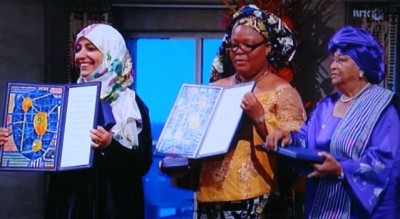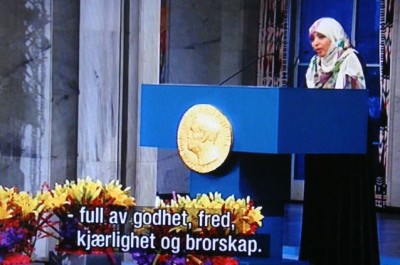The three women who were awarded this year’s Nobel Peace Prize in Oslo on Saturday are, according to one of them, “linked by their commitment to change” along with peace, democracy and justice. New Nobel Laureate Ellen Johnson Sirleaf, the president of Liberia, also used some of her time at the podium to hail the people of Norway, for their peaceful response to the terrorist attacks last summer.

Directly addressing King Harald and Queen Sonja, who, as usual, were sitting at the front of the roughly 1,000 people who filled Oslo’s City Hall, Sirleaf called the attacks “a deliberate assault on the very heart of your society. Yet, in the face of such adversity, the response at every level of public and private Norwegian life has been consistent with your historic adherence to the values of openness, integrity and justice.
“For this, the world admires you and all of the citizens of this great country. I offer you the deepest sympathy of the people of Liberia for the loss of life and I extend to you our profound respect.”
It was Sirleaf and her co-winners – fellow peace activists Leymah Roberta Gbowee, also of Liberia, and Tawakkol Karman of Yemen – who won the respect of the Norwegian Nobel Committee members for their non-violent struggles for democracy, to improve safety for women and ensure their rights to participate in peace-building efforts. Committee chairman Thorbjørn Jagland cited the accomplishments of each of the women individually in his opening remarks at the Peace Prize ceremony and said: “We thank you for the hope you awaken in all of us.”
Jagland also seized the opportunity to counter ongoing criticism that the committee has moved away from the terms of benefactor Alfred Nobel’s will, which emphasized disarmament and peace congresses. Jagland, after noting the progress made in Liberia since Sirleaf became president in 2006, with the civil war over and democracy in place, said that “few other persons better satisfy the criteria for receiving the Peace Prize mentioned in Alfred Nobel’s will.”
The same applies to Leymah Gbowee, Jagland claimed, calling her “the trauma specialist who switched from treating war victims to working for peace.” Gbowee was credited with mobilizing a network of more than 2,000 women in Liberia to protest the war and the violence. Her efforts have since spread to other areas of conflict in Africa.

Tawakkol Karman, Jagland said, has been among those imprisoned and “exposed to serious threats” for her non-violent efforts to bring an end to dictatorship and injustice in Yemen. “She organized peaceful sit-ins and information campaigns,” Jagland said. Nothing has stopped her, he added, as she “campaigns for democracy, women’s rights and tolerance. She advocates understanding between Shias and Sunnis and between Islam and other religions.”
Jagland stressed the winners’ shared concern for and advocacy of women’s rights as vitally important to peace. “The promising Arab Spring will become a new winter if women are again left out,” Jagland said. Violence against women “must cease” and women “must be fully accepted in all sectors of community life. Karman, he said, has shown that Islam presents no obstacle to this. “On the contrary, Islam must be part of the solution,” Jagland said. “Only then will there be democracy and peaceful development in this part of the world. That will mean greater security for all of us.”
To read the texts of all the speeches at the Nobel Peace Prize ceremony, also from the winners, click here (external link).
The ceremony began promptly at 1pm as usual and developed into the lengthiest in recent years, with all three winners delivering what’s officially called the “Nobel Lecture.” There also were a series of musical interludes, including an opening performance by Mari Boine, known for her powerful interpretations of indigenous Sami yoiks.

In attendance, in addition to members of the Norwegian royal family, were specially invited guests of the winners, the diplomatic corps and most members of the Norwegian government with the exception of Prime Minister Jens Stoltenberg, who is on an official visit to Australia. His wife, diplomat Ingrid Schulerud, was in the front row, however.
The grand lobby of City Hall, adorned with murals, was also decorated with colorful arrangements of flowers including many from Africa. Many of the guests also sported colorful clothing, and waved small flags throughout the ceremony.
Views and News from Norway/Nina Berglund
Please support our stories by clicking on the “Donate” button now:

